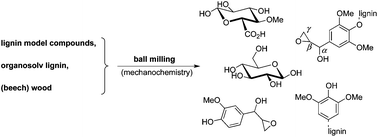Scientists from Germany employed a mechanochemical approach to cleave β-O-4-linkages in lignin.
In recent years, plant biomass has come to the fore due to it’s potential to replace fossil-fuel derived chemicals. Lignin is one of the three main constituents of biomass, but it’s use is hampered by its poor solubility and structural complexity. The β-O-4-linkage is the most abundant linkage found in lignin, and attempts to cleave them currently employ harsh reaction conditions.

Read this article for free until the 3rd January!
Mechanochemical degradation of lignin and wood by solvent-free grinding in a reactive medium, Tillmann Kleine, Julien Buendia and Carsten Bolm, Green Chem., 2013, DOI: 10.1039/C2GC36456E
You may also be interested in this article too – free to access for 2 weeks:
Mechanocatalysis for biomass-derived chemicals and fuels, Sandra M. Hick, Carolin Griebel, David T. Restrepo, Joshua H. Truitt, Eric J. Buker, Caroline Bylda and Richard G. Blair, Green Chem., 2010, 12, 468-474
Stay up-to-date with the latest news and content in Green Chemistry by registering for our free table of contents alerts.










